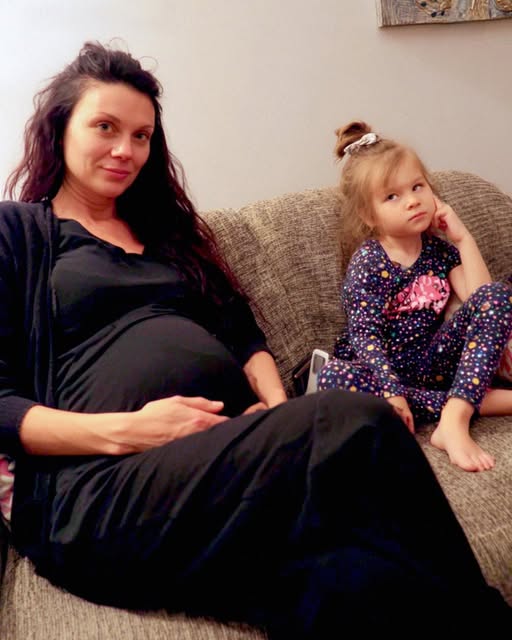I was 39 weeks pregnant, heavy with exhaustion and pain, but I still tried to put on a smile for my husband Alan’s 39th birthday dinner. I wanted the night to feel special, a chance for us to be together as a family before the baby arrived. Instead, his words at the table cut so deep that I grabbed my daughter’s hand and walked out, leaving everyone stunned. That night, I realized nothing would ever be the same.
I’m Catherine—everyone calls me Cathy. At 38 years old, expecting our second child, my body felt stretched to its limits. Every step sent jolts of pain down my legs, and sleep had become a distant memory. Our daughter Zoey, a bright four-year-old full of questions, was my joy but also my daily challenge. This pregnancy had been harder, and my doctor kept urging me to rest. But rest was impossible when Alan was never around. He attended just one ultrasound and brushed off every request for help with the nursery. The crib still leaned against the wall, boxes piled high, a symbol of his promises left undone.
When his sister Kelly invited us to a small family dinner for his birthday, I thought it might be the calm night we all needed. I wore my best maternity dress, the one Alan once loved. He didn’t notice. At Kelly’s apartment, the table was beautifully set, the air smelled of roast chicken, and the family gathered warmly around him. For a moment, it felt almost perfect.
But halfway through dinner, Alan turned to me with a grin. “Why don’t you take Zoey home after we eat and put her to bed? I’ll stay here, have a few beers with Jake, maybe smoke a cigar. Like the old days.”
The fork slipped from my hand. “You want me to leave? Alone? At nine months pregnant?”
He shrugged, as if it were the most natural thing in the world. “You’re always saying you’re tired. And someone’s got to put Zoey to bed.”
The silence around the table was heavy until his mother, Grace, broke it. Her voice was sharp, calm, and devastating. She repeated his words back to him, forcing him to hear them aloud—the selfishness, the recklessness. She reminded him that his wife could go into labor at any moment, that he had left me to carry every burden alone, and that he was treating fatherhood like a chore. Alan flushed red, shrinking into his seat while everyone else avoided his eyes.
I couldn’t stay another second. I stood slowly, my body aching with each movement, and took Zoey’s hand. “Come on, sweetheart. Let’s go home.” She asked if Daddy was coming too. I looked at the man I had loved for eight years, frozen in his chair, and told her no.
Grace followed us home, quietly humming to soothe Zoey in the car. Later, as she read her granddaughter a bedtime story, I sat on the couch, my back throbbing, wondering when my marriage had turned into this emptiness. Grace returned with tea and sat beside me, her support a steady comfort. “You won’t be alone,” she told me. “No matter what my son chooses, I’ll be here for you and this baby.”
As the baby kicked hard against my ribs, I realized she was right. Alan hadn’t come home, and maybe he wouldn’t. But I was no longer afraid of the birth itself. I was afraid of what kind of father, what kind of partner, Alan had chosen to be. Still, as I pressed my hands over my belly, I whispered to the child inside me a promise: “You will never doubt that you are loved. Not for one single second.”
That night, everything shifted. Soon I’ll have decisions to make—about my marriage, about the example I want to set for my children, about what I will and will not accept in the name of love. For now, I’m just a mother waiting for her baby to arrive, surrounded by those who truly care, ready to fight for the family my children deserve, even if it looks different than I once imagined.
